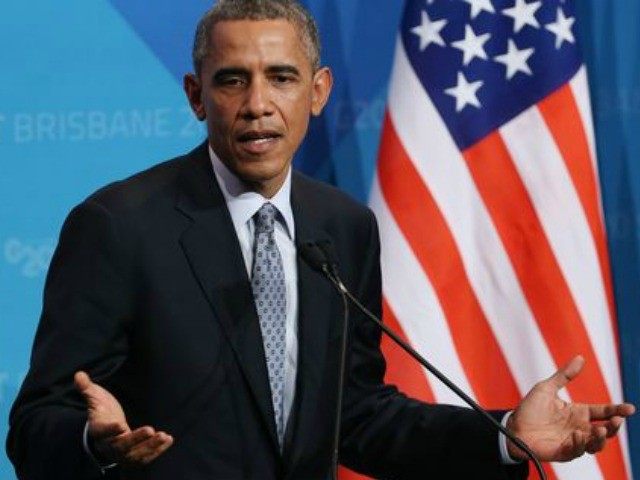The outgoing head of the Defense Intelligence Agency, Lt. General Michael Flynn, is not leaving quietly. The Daily Beast characterizes his departing comments as “slamming” and “unloading on” President Obama’s foreign policy, which Flynn sees as a timid, confused, politicized approach to a global threat that should be met with a Cold War-style campaign against an enemy as committed to “the destruction of freedom and the American way of life” as the Soviet Union ever was.
The publication highlights the sharpest of his remarks:
“There is no substitute, none, for American power,” the general said, to occasional cheers and ultimately a standing ovation from a crowd of special operators and intelligence officers at a Washington industry conference.
He also slammed the administration for refusing to use the term “Islamic militants” in its description of ISIS and al Qaeda.
“You cannot defeat an enemy you do not admit exists,” Flynn said.
He said the administration is unwilling to admit the scope of the problem, naively clinging to the hope that limited counterterrorist intervention will head off the ideological juggernaut of religious militancy.
“There are many sincere people in our government who frankly are paralyzed by this complexity,” said Flynn, so they “accept a defensive posture, reasoning that passivity is less likely to provoke our enemies.”
Flynn refused to name President Obama as the focus of his ire in comments afterward to The Daily Beast, saying that he was simply “sending a message to the American people.” But the comments show the widening rift between some in the national-security community who want to see more special-operations and intelligence assets sent into the fight against ISIS and other groups in Syria and beyond.
Flynn sat for an interview with James Kitfield of Breaking Defense, who introduces his guest as “disruptive” in the estimation of his political adversaries. Those adversaries might just have been formidable enough to force the General into early retirement, a year ahead of schedule, their ire piqued by his penchant for disrupting preferred Obama Administration narratives about al-Qaeda and its progeny being “on the run” after Osama bin Laden’s death.
There’s more than just Islamist terrorism on the DIA plate after six years of Obama foreign policy. “I will frankly tell you that what I see each day is the most uncertain, chaotic, and confused international environment that I’ve witnessed in my entire career,” Flynn said in the Breaking Defense interview. He allowed that the world was arguably more dangerous when the Nazis and Imperial Japan were running wild, but “we’re in another very dangerous era,” where “it feels like we’ll be facing a familiar threat and heightened uncertainty for a long time yet.”
Things are dangerous enough for Flynn to judge that America is no safer from Islamist terror than it was before 9/11. “Today, there are 41 Islamic terrorist groups spread out in 24 countries,” he warned. “A lot of these groups have the intention to attack Western interests, to include Western embassies and in some cases Western countries. Some have both the intention and some capability to attack the United States homeland.” He’s particularly worried about terror operatives with military training flowing back into the West from ISIS conflict zones in Syria and Iraq, possibly with chemical weapons as souvenirs of their battle against the Assad regime.
Most worrisome of all is the spread of an ideology as toxic as any weapon of mass destruction: the ideology of perpetual jihad. Flynn sees the jihadis as better organized than ever, battle-hardened from conflict against America and her allies in Iraq and Afghanistan, more willing and able to cooperate internationally than ever, and clearly capable of weathering the overhyped winds of democracy from the Arab Spring. One of the views that apparently put Flynn on the outs with Team Obama was his belief that jihad ideology cannot be effectively disabled by “decapitating” the leadership of Islamist groups. That’s a notion very dear to current Administration thinking, because it allows them to posture as terrorism-smashers with light-footprint, low-risk operations, such as the ubiquitous drone strike. It also folds into the American political elite’s cherished notion of jihad as the hijacking of a great and peaceful religion by a tiny minority of extremists. Wipe out the big shots in that tiny minority with drone strikes, and the problem goes away!
Except it didn’t go away. It’s getting worse. The jihadi ideology is clearly capable of surviving the demise of high-profile leadership targets. “Decapitation” strategies obvious aren’t going to be effective against China, North Korea, Russia, or Iran, included among Flynn’s list of threats and challenges.
General Flynn seems to be in fairly good spirits about his retirement – he modestly allows that he might have gotten “a little too far out in front of my headlights,” but seems to accept a bit of political turbulence as a natural consequence of his mission to shake things up. However, it is not comforting that such a prominent critic of clearly failed strategies is leaving the team. Flynn told Kitfield that anyone who thought terrorists were on the run after bin Laden’s death “either doesn’t know what they are talking about, they are misinformed, or they are flat out lying.” That covers everyone involved with President Obama’s 2012 re-election campaign. Does it cover everyone in the intelligence community who can still get the President’s attention?

COMMENTS
Please let us know if you're having issues with commenting.